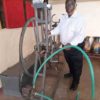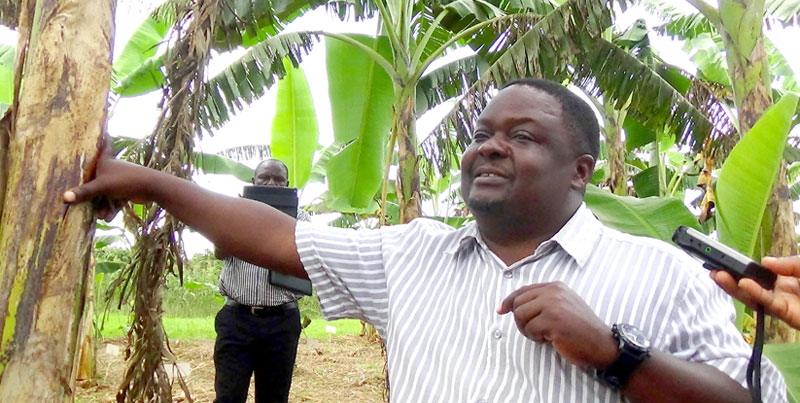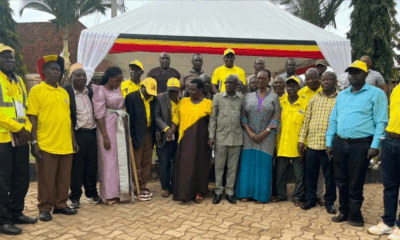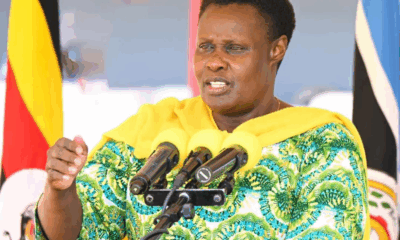Nsubuga; Pioneer of Uganda’s tissue culture commercialization shares insights for future of food industry

Nsubuga showing peeled and packed bananas that he now exports to Canada
He witnessed the telecom boom across Africa but missed out on the opportunity to personally invest in the promising industry at the time for lack of capital.
He said: “I used to come here in the 1990s and told some Ugandan business people to get a license and operate a private telecom network. They didn’t believe me. Now I can tell you; the next big business is food.”
It is perhaps this missed opportunity in the telecom boom that fired him up to look for alternative areas of investment avenues in Uganda.
Using his science background and his business acumen, Nsubuga spotted an opportunity in developing planting materials using Tissue Culture technology as a potentially lucrative venture, after all many of Uganda’s staple crops including bananas, sweet potatoes, cassava were grown using vegetative means of propagation – hence the need for tissue culture as a technology best suited for multiplying the needed planting material.
Having cracked the idea, Nsubuga founded AgroGenetic Laboratories Ltd, Uganda’s first private Tissue Culture firm to provide disease-free planting material.
More fortunate for him, Ugandan farmers at the time were facing devastating losses to their banana and coffee production arising from the outbreak of banana bacterial wilt and coffee wilt respectively. Cooking bananas or East African highland bananas as they are known, is the staple food for majority of the people in central Uganda. Coffee on the other hand, remains the biggest source of income for most rural farmers in the region.
At their height, the two diseases caused up to 90 percent destruction of crops, causing food insecurity and widespread poverty in the region. But the scientists from government research institutions were unable to find solutions to what appears to be complex diseases using available techniques.
“People were yearning for disease-free planting material especially for bananas and coffee because what was available was all diseased. Banana bacterial wilt and coffee wilt had wiped out people’s plantations and there was a huge demand for planting material,” recalls Nsubuga.
Since the outbreak of the two diseases more than ten years ago, scientists have only been able to find a solution to banana bacterial wilt (BBW) using Genetic Engineering (GM). However, farmers are still unable to obtain bananas that are resistant to BBW because of the absence of a regulatory framework that allows for commercialization of GM products.
But with Tissue Culture, Nsubuga’s test-tube grown plants provided relief to farmers because they were disease free.
He adds: “With tissue culture, I was able to supply farmers with huge quantities of a specific variety in a short time which was not possible before.”
Theoretically at least, a number of factors such as the prevailing institutional arrangement that made it almost impossible for government research institutions to distribute planting material to farmers, ensured that he would be a monopoly player in the field at least for a few years. This was coupled by the collapse of the government extension worker system that delineated farmers from experts.
A few obstacles however threatened Nsubuga’s ambition. The technology was new and most farmers didn’t appreciate it at first.
“Most people could not believe one could get a vigorous plant by simply planting a small shoot of a banana grown in a test tube that was only a few centimeters tall as opposed to the longstanding tradition of planting suckers,” he recalls.
To overcome this phobia, he worked with a few progressive farmers around the country by setting up nurseries on their gardens that worked as experimental plots from where the skeptical farmers witnesses the high potential for Tissue culture in overcoming their disease challenges.
He also battled against unreliable electricity that was essential for ensuring that his test-tube plants would grow, as well as absence of skilled man power.
None of these however deterred him from pursuing his ambition. With technical support from government researchers at Kawanda and Namulonge research stations, coupled with his outreach programmes to farmers, Nsubuga gradually won the confidence of farmers.
It did not take long before his research firm AGT Laboratories located about 12 kilometers outside Uganda’s capital Kampala, became a major attraction for senior politicians including President Yoweri Museveni who sought solutions to key questions from desperate farmers across the country who wanted the government to address their plight.
Besides, President Museveni used Nsubuga’s firm to showcase progress to modernize Uganda’s agriculture for some of his visiting counterparts.
As Nsubuga explained, whereas Tissue Culture did not produce disease resistant crops, it lessened the impact of the diseases by availing farmers with good foundation disease -free ‘seeds’ which they could use while scientists sought lasting solutions for the diseases.
His pioneering work further attracted the goodwill of the government in terms of lucrative contracts to supply millions of coffee and banana seedlings to central and local government agencies to revive the country’s dwindling coffee and banana production following the outbreak of the two diseases in the late 1990s and very early years of the 21st century.
Considering the importance of the two crops to the lives of farmers as well as the country, demand quickly overtook supply. He estimates demand for tissue culture to be over 10m plant lets every year, out of which he is only able to supply half.
A decade since its creation, AGT has become the leading private producer of tissue culture material in East Africa. His operations have expanded from a dozen plant lets a year to over 4 million in 2012.
Nsubuga has opened up branches in Kigali – Rwanda and plans to expand to other countries in the region. He told a group of visiting journalists under the Bio sciences for Farming in Africa, that he has plans to expand his operations to include at
raining facility for farmer groups as well as students in an effort to contribute to better understanding of the technology as well as enable Ugandans take advantage of the vast potential in producing food for the national, regional and possibly global market.
His entrepreneurial skills coupled with his success through AGT have thrust him onto the national stage where he has been named at strategic national bodies meant to spur food production.
Between 2006-2009, Nsubuga served as chairman of the Presidential Investors Round table on agribusiness. He has also served on several other boards in the agricultural sector including the regulatory body that oversees research in the development of genetically modified organisms. With these roles, he has championed reforms in agriculture industry as an engine for economic transformation.
His relationship with government have not barred him from criticizing government policies on agriculture.
He has for instance criticized the government for failing to invest in the sector and for failing to develop a sound plan for agricultural transformation for Uganda.
Nsubuga argues that the absence of a solid framework and sustainable investment strategy for agriculture in Uganda will deter farmers from taking advantage of the emerging high demand for food.
Nsubuga argues however that Uganda will need to modernize her agriculture by adopting biotechnology, specifically Genetic Modification, because it helps in the development of disease resistant, high yielding varieties much faster than conventional breeding methods.
“Biotechnology is the future of agriculture because the climate is against man. Climate change and global warming are wiping out some varieties while also producing new pests. But with biotechnology, remedies can be developed much faster than in conventional methods.
Nsubuga argues that food production will be one of the biggest sources of revenue in the near future, but it will require smart investors and smart policies from the government.
Nsubuga is not alone in predicting that the agriculture will be the next booming sector and therefore make smart people rich. Sometime last year, some of America’s richest men were asked where they wanted to invest their money, and majority replied food production, in Africa.
Legendary American investor and commodities expert Jim Rogers told a respected magazine Forbes last year that:
“There’s going to be a huge shift in American society, American culture, in the places where one is going to get rich. The stock brokers are going to be driving taxis. The smart ones will learn to drive tractors so they can work for the smart farmers. The farmers are going to be driving Lamborghinis. I’m telling you. You should start Forbes Farming.”
While praising the government for taking steps to introduce a law that will regulate GM crops, Nsubuga criticized government bodies and individuals for failing to develop an effective framework that ensures farmers get proper seeds while also supporting strategic interventions.
He criticized the failure of the Ministry of Agriculture to develop networks with private organizations like his, to multiply seeds very rapidly since the research institutions are not meant to multiply seeds of new varieties quickly.
“It’s amazing that I am the biggest single producer of bananas (plant lets) in East Africa but very few policy makers and researchers have visited my farm to develop some formal relationship,” he wondered.
Nsubuga revealed that some people in government personally sabotaged his development out of intrigue. He cited an offer for land that was made by President Museveni in 2008, which he says were frustrated by officials in the ministry of finance.
“In 2008, following his visit to my farm, President Museveni directed officials from ministries of finance, agriculture and energy to support me with a generator, land for expansion at Namanve, and a substantial order. Up to today, nothing has ever come,” Nsubuga, a former presidential advisor on agriculture said he has not bothered to remind the president because he still has substantial business from Rwanda.
Apart from the Uganda Coffee Development Authority, UCDA, which he says has awarded him a contract to develop 2 million coffee seedlings, other government programmes are not showing interest in expanding crop productivity.
He said: “At least UCDA has tried to be organized. But NAADS [National Agricultural Advisory Services] operates in a very haphazard fashion. They always call me to supply seedlings on the spot which is not possible.”
On the contrary he says that Rwanda appears more organized as evidenced by the way they place orders well in advance of their planting season.
Ventures into Processing
Having succeeded in perfecting the multiplication of bananas and coffee, Nsubuga has now set his sights on adding value to bananas. Using modern machines, he has started to export peeled cooking bananas to Canada besides packaging raw ones and selling them in local super markets.
In addition, Nsubuga has obtained land near his Buloba-based AGT facility, where he wants to shift his nursery beds and create space for farmers training centre.
My interest is to train farmers to obtain skills not only of doing some of what I do, but also to learn better farming practices.
His successes story has inspired other local scientists to open up at least two other similar establishments. With commercialization of agriculture gaining momentum in Uganda, the industry looks headed for better times and perhaps the rest of the farming community.
Comments

























